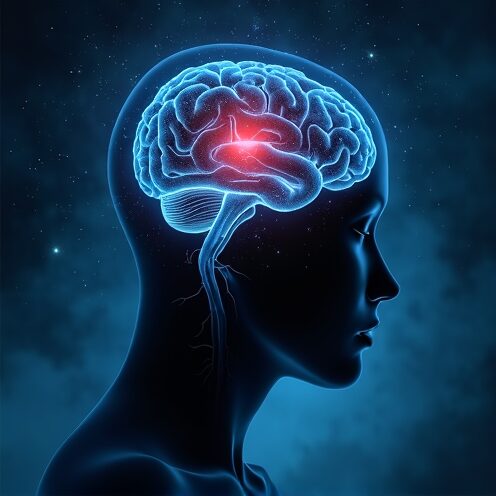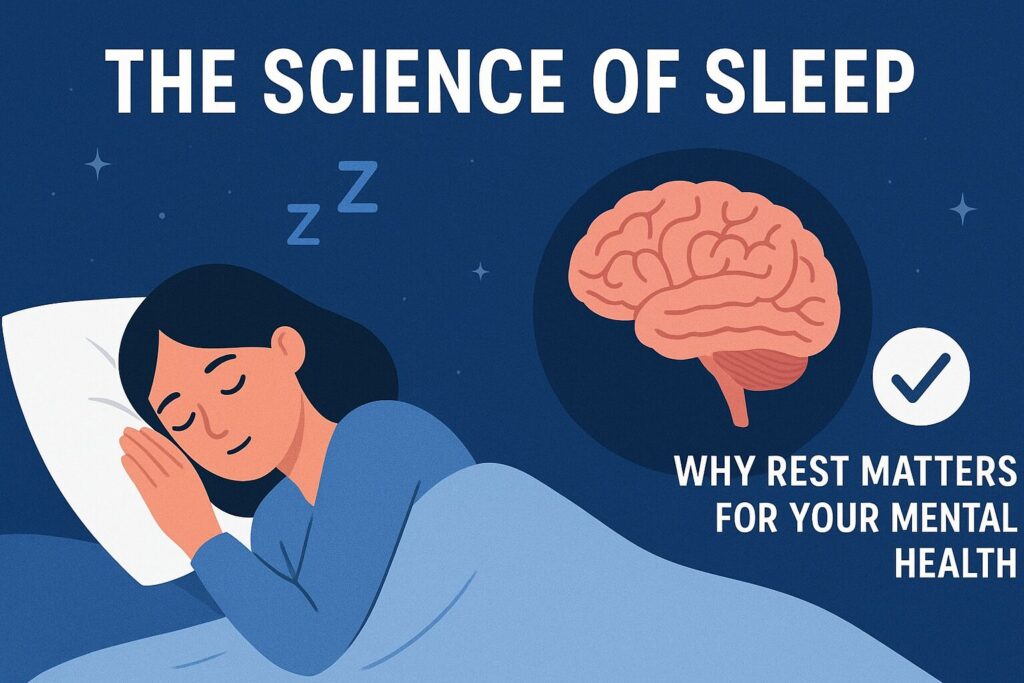
If you’ve ever felt more irritable, scattered, or just “off” after a bad night’s sleep, you’re not imagining it. Sleep is not just downtime, it’s an active process your brain and body rely on for emotional balance, memory, and overall resilience.
Yet, according to the CDC, over one-third of American adults regularly miss the recommended seven hours of sleep(CDC). And for many, it’s not occasional restlessness, it’s a persistent cycle of tossing, turning, and waking up tired.
The Neuroscience of Sleep and Insomnia
Sleep isn’t just passive rest – it’s an intricate biological performance where your brain works overtime to optimize your mind and body. Cutting-edge research reveals that during sleep:
- Your brain’s cleaning crew activates – The glymphatic system kicks into high gear during deep sleep, flushing out toxic byproducts like beta-amyloid (linked to Alzheimer’s) that accumulate during waking hours (Xie et al., 2013).
- Memory and emotion centers reorganize – While you sleep, your brain replays the day’s experiences, strengthening important memories in the hippocampus while processing emotions in the amygdala. REM sleep acts like overnight therapy, helping you wake up with better emotional balance (Walker & van der Helm, 2009).
- Creativity gets a boost – Sleep reorganizes information in novel ways, which explains why we often solve problems better after “sleeping on it” (Wagner et al., 2004).
When Sleep Fails: The Neuroscience of Insomnia
Insomnia isn’t just “trouble sleeping”, it’s a neurological state of hyperarousal where:
- The brain’s “on switch” (the hypothalamic and brainstem wake-promoting systems) gets stuck in overdrive (Riemann et al., 2010).
- The normal seesaw between wakefulness and sleep neurotransmitters (like GABA and glutamate) becomes unbalanced (Nofzinger et al., 2004).
- The circadian timing system gets desynchronized, like an orchestra where the instruments play out of rhythm (Reid & Zee, 2009).
This creates a vicious cycle where the more you struggle to sleep, the more your brain learns to associate bed with wakefulness. Understanding these mechanisms helps explain why simple relaxation often isn’t enough – we need science-based strategies to retrain the sleep-wake system.
Why Sleep and Mental Health Are Deeply Connected

During sleep, the brain takes out the “nightly trash”—clearing away waste products like beta-amyloid, consolidating memories, and recalibrating mood-regulating systems. Without enough rest, emotional regulation falters.
Research consistently shows that:
- 50–80% of people with mental health conditions have chronic sleep problems (Verywell Health).
- In major depression, up to 88% experience insomnia, while nearly a third experience hypersomnia, sleeping far more than usual (Wikipedia).
- Insomnia doesn’t just co-exist with depression, it can double the risk of developing it later (Verywell Health).
It’s a bidirectional relationship: poor sleep worsens mental health, and poor mental health disrupts sleep. Breaking the cycle means addressing both.
Building a Healthier Sleep Life: A Habit Flow
Rather than a list of “shoulds,” think of this as a gentle, 24-hour rhythm designed to help your mind and body work with you, not against you.
☀️ Morning & Daytime Foundations (Set your brain’s sleep clock early)
- Wake at the Same Time Daily
Keep your wake-up time consistent—even on weekends. Step outside within 30 minutes of waking to anchor your circadian rhythm. - Exercise Early
Move your body for at least 30 minutes—walk, stretch, cycle. Keep vigorous workouts away from bedtime. - Limit Caffeine & Stimulants
No coffee, tea, or chocolate after 2 PM. Skip nicotine entirely or cut it off at least an hour before bed. - Nap Wisely
If you must nap, keep it under 30 minutes and before 3 PM. It can be like meditation time through mindfulness, guided hypnosis music or simply by keeping your thought in control to not rumble around or ruminate. - Eat with Sleep in Mind
Avoid heavy, fatty dinners within two-three hours of bed. Go easy on alcohol or sweet beverages, because it can fragment sleep later in the night.
🌙 Evening Wind-Down (Transition from doing to resting)
- Digital Sunset
Power down screens an hour before bed. Dim the lights and let your body register “night is here.” - Relaxation Ritual
Choose soothing activities: a warm shower, gentle yoga, mindfulness meditation, reading something light, or listening to soft music. - Optimize Your Environment
Keep your bedroom cool (60–67 °F), dark, and quiet. Invest in comfortable bedding.
🛌 In-Bed Strategies (When your head hits the pillow)
- Bed = Sleep Only
Don’t work, snack, or binge-watch in bed. If you’re awake more than 20 minutes, step out and do something calming until drowsy. - Mindful Rest
Try a body scan meditation, visualize leaves floating down a stream, or reflect on three small things you’re grateful for.
🔄 If Sleeplessness Persists
- Keep a brief sleep journal to spot patterns.
- Look into CBT-I (Cognitive Behavioral Therapy for Insomnia)—the gold standard, non-drug treatment.
- Talk to a specialist if you suspect conditions like sleep apnea or restless legs.
How Daisy Clinic Can Help
At Daisy Clinic Therapy & Counseling, we understand that sleep issues rarely exist in isolation, they’re often tangled with stress, anxiety, depression, trauma, or lifestyle patterns that feel impossible to change alone. That’s why our approach is both science-based and tailored to the individual.
We offer:
- Cognitive Behavioral Therapy for Insomnia (CBT-I) – a structured, research-backed method proven to improve sleep in both the short and long term.
- Mindfulness-Based Sleep Strategies – helping you shift from “trying to sleep” to letting your body naturally drift into rest.
- Stress & Anxiety Management – addressing the root causes that keep your mind active at night.
- Lifestyle & Sleep Hygiene Coaching – personalized guidance to fine-tune your environment, daily routine, and bedtime habits.
Our therapists draw from decades of research and clinical experience, creating a plan that works for your specific needs, not a one-size-fits-all checklist. Whether your goal is fewer sleepless nights, more energy in the day, or simply feeling calmer, we walk with you through every step.
The Takeaway
Better sleep isn’t about perfection, it’s about patterns that support you. With the right tools and support, your brain can relearn how to rest deeply.
If you’ve been living with insomnia or chronic sleep deprivation, Daisy Clinic is here to help you reclaim your nights and your days.